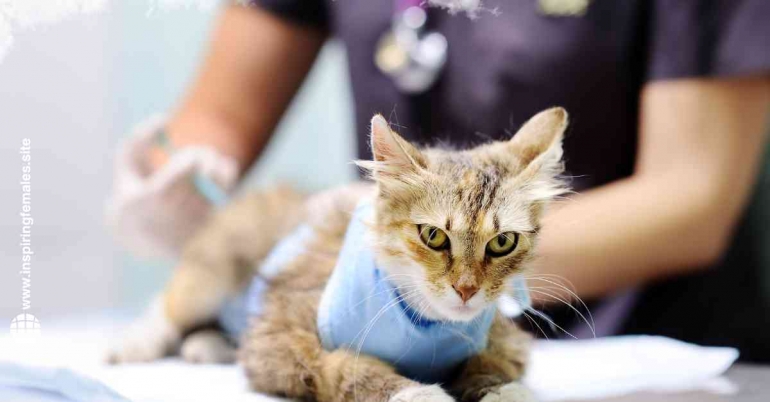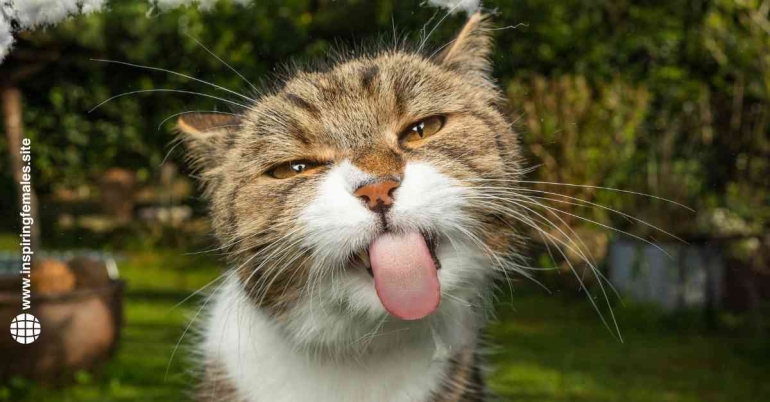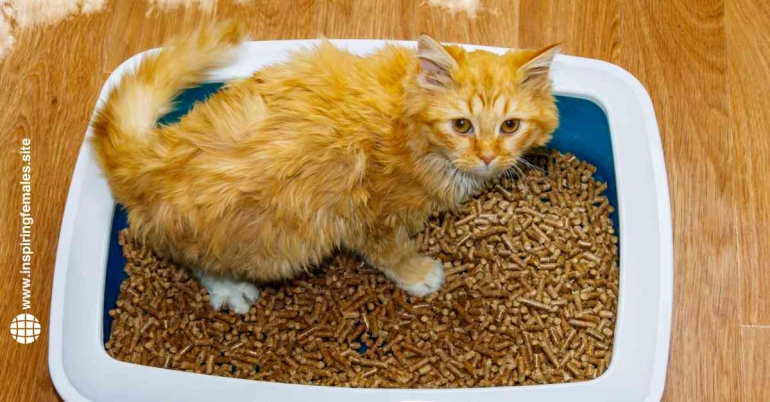Cat constipation is a common issue characterized by difficulty in emptying the bowels, often accompanied by the presence of hard feces. While occasional constipation can occur even in healthy cats, frequent episodes occurring more than once a month may indicate an underlying problem. In this article, we will explore the causes of cat constipation and suggest effective remedies to alleviate this condition.
Cats typically have one to two bowel movements per day. The appearance of normal cat feces is similar to Tootsie Rolls, varying in size based on diet and individual cat traits.

Signs of Abnormal Litter Box Behavior in Cats
Typically, cats exhibit a rounded back posture while defecating and a flatter back posture while urinating. However, if a cat maintains a rounded defecating posture for an extended period in the litter box, it may indicate constipation.
There are several unusual behaviors related to litter box usage that you should be aware of. These include excessive crying, prolonged digging in the litter, and throwing litter outside the box. If your cat is pooping over the edge of the box or leaving feces in other areas of the house, it could be a sign of constipation.

There are several unusual behaviors related to litter box usage that you should be aware of. These include excessive crying, prolonged digging in the litter, and throwing litter outside the box. If your cat is pooping over the edge of the box or leaving feces in other areas of the house, it could be a sign of constipation.

3. Inflammatory bowel disease (IBD) is a medical condition of notable significance, marked by inflammation within the digestive tract. Constipation often manifests as a prominent symptom among individuals afflicted with IBD.
4. Cats may be born with or develop abnormal anatomy as they age, such as megacolon, colon polyps, colon strictures, or tumors. These abnormalities can contribute to constipation.
5. Certain medications, including anesthetics, pain medications, barium used in x-ray studies, iron supplements, diuretics (e.g., Lasix), antihistamines (e.g., Benadryl), sucralfate, and antacids, can potentially cause constipation in cats. It's important to consult your vet before discontinuing any prescription medication.
6. Cats experiencing anxiety due to a new home, boarding, or inter-cat aggression issues may become constipated because they don't regularly move their bowels. The Indoor Pet Initiative website offers resources for managing anxiety in multi-cat households.
7. Excessive ingestion of fur is common in cats during grooming. When cats over-groom or have an excessive amount of hair to eliminate, constipation can occur as a result.
Effective Home Remedies for Cat Constipation:
Gradual Diet Modifications:
When introducing diet changes, it's important to do so gradually over a week. This will help prevent any potential upset stomach in your feline friend.
Adding moisture to your cat's diet aids in digestion and promotes smoother bowel movements. Opting for high-fiber, low-residue, or hypoallergenic foods can also be beneficial. Consult your veterinarian for guidance in selecting the right food for your cat's needs.
When it comes to helping your pet with digestive issues, such as constipation, incorporating laxatives and fiber into their diet can be beneficial. One excellent option for pets is Vetasyl, a psyllium supplement specifically formulated for their needs. It provides a convenient way to address constipation in cats, dogs, and other animals.
Vetasyl comes in capsule form, which can be easily opened and mixed with moist food, ensuring that your pet receives the necessary dosage without any hassle. The psyllium in Vetasyl acts as a gentle yet effective natural laxative, aiding in the movement of waste through the digestive system. By incorporating this supplement into your pet's diet, you can help alleviate constipation and promote regular bowel movements.
Additionally, another approach to providing relief to your cat's constipation is by adding a tablespoon of canned pumpkin to their food a couple of times a day. Pumpkin is rich in fiber, which adds bulk to the stool and helps promote healthy bowel movements. This natural remedy is often well-tolerated by cats and can assist in easing constipation.
Remember to consult with your veterinarian before introducing any new supplements or dietary changes to your pet's routine. They can provide specific recommendations based on your pet's individual needs and ensure that the chosen approach is safe and effective.
========================================
Miralax, also known as polyethylene glycol 3350, is a commonly used human remedy that has shown positive results in alleviating constipation in cats. When used appropriately and under veterinary guidance, Miralax can help regulate a cat's bowel movements and provide relief from discomfort.
When considering the use of Miralax for constipated cats, it is important to follow the recommended dosage guidelines. The suggested dosage is typically 1/8 to 1/4 teaspoon of Miralax mixed into the cat's food, administered twice daily. This dosage can be adjusted based on the severity of the constipation and the cat's individual needs. However, it is crucial to consult with a veterinarian before administering Miralax to ensure the correct dosage for your specific cat.
While Miralax can be effective in treating constipation, it is essential to exercise caution and avoid using it if you suspect a complete bowel obstruction in your cat. A complete bowel obstruction is a serious condition that requires immediate veterinary attention. If your cat shows signs of severe abdominal pain, vomiting, or a complete lack of bowel movements, it is crucial to seek professional veterinary care promptly.
In addition to using Miralax, it is important to address the underlying causes of constipation in cats. Factors such as inadequate hydration, lack of dietary fiber, or underlying medical conditions can contribute to constipation. Therefore, it is recommended to provide your cat with fresh water at all times and ensure their diet includes sufficient fiber content. Consulting with a veterinarian can help determine any underlying issues and provide guidance on appropriate dietary adjustments or additional treatments.
Remember, while Miralax can be beneficial in relieving constipation in cats, it is crucial to consult with a veterinarian before administering any medication. They can provide the best advice tailored to your cat's individual needs, considering their overall health and any underlying medical conditions. By working closely with your veterinarian, you can ensure the well-being and comfort of your feline companion.
When it comes to addressing cat constipation, it's essential to consider safe and effective options for prevention and treatment. Two noteworthy choices in this regard are Lax'aire and Laxatone, which are both oral gels classified as lubricant-type laxatives. These products have garnered a positive reputation for their ability to alleviate feline constipation without compromising the well-being of our furry companions.
When seeking a solution for cat constipation, it's crucial to steer clear of certain substances that may pose risks. For instance, mineral oil, though commonly used as a lubricant laxative in humans, is not recommended for cats due to the potential hazard of inhaling the oil. This inhalation risk can lead to serious complications, making it an unsuitable choice for feline digestive health.
Similarly, while olive oil is often considered a natural remedy for constipation in humans, it may not be the best option for our feline friends. Olive oil contains a high concentration of fat, which can cause digestive upset when consumed in significant quantities by cats. Thus, it's advisable to exercise caution when considering olive oil as a laxative for cats.
In contrast, Lax'aire and Laxatone offer a reliable alternative for cat constipation relief. These oral gels are specially formulated to provide lubrication and ease the passage of stools, promoting regular bowel movements for cats. Their effectiveness as both preventive and treatment measures have made them trusted choices among pet owners and veterinarians alike.
By utilizing Lax'aire or Laxatone, cat owners can proactively address constipation issues in their feline companions. These products work by lubricating the digestive tract, making it easier for stools to pass through the intestines without discomfort or straining. This gentle and non-invasive approach is crucial for maintaining the overall well-being and gastrointestinal health of cats.
It's important to note that before administering any laxative or medication to your cat, it's recommended to consult with a veterinarian. They can provide tailored advice based on your cat's specific needs and health conditions, ensuring the safest and most effective course of action. Your veterinarian will be able to guide you on the appropriate dosage and frequency of use for Lax'aire or Laxatone, taking into account your cat's circumstances.
In summary, when addressing cat constipation, it's vital to prioritize safe and effective solutions. Lax'aire and Laxatone stand out as reliable options due to their lubricant-type formulation, providing gentle relief without the potential risks associated with mineral oil or the high-fat content of olive oil. By consulting with your veterinarian and incorporating these products into your cat's care routine, you can help promote regular bowel movements and ensure their overall digestive health and well-being.
When it comes to administering enemas to cats, I strongly advise against attempting this procedure at home. It is crucial to recognize that most cats tend to resist and struggle during the process, which can potentially lead to unintended harm and injury to their delicate tissues. Therefore, unless you have received proper training and guidance in performing enemas on felines, it is best to leave this task to veterinary professionals who possess the necessary expertise and experience in handling such procedures safely and effectively. By entrusting your cat's health to trained professionals, you can ensure its well-being and minimize the risk of any adverse outcomes.
When it comes to addressing constipation in cats, one potential solution lies in harnessing the power of probiotics. These beneficial bacteria can play a crucial role in improving your cat's gastrointestinal (GI) health. Introducing probiotics into your cat's diet might offer significant relief and aid in the treatment of constipation.
One recommended approach is to incorporate probiotics into your cat's meals. Two widely recognized and trusted probiotic products for cats are Proviable DC and Fortiflora. These supplements can be mixed into your cat's food, ideally during one meal each day, for a minimum of 14 consecutive days.
The use of probiotics, such as Proviable DC or Fortiflora, can contribute to rebalancing and optimizing the bacterial composition in your cat's GI tract. This balance is crucial for maintaining a healthy digestive system and preventing issues like constipation.
By regularly administering probiotics, you are introducing a diverse range of beneficial bacteria to your cat's gut. These probiotics work to enhance the natural processes of digestion and promote a healthier gut environment. They can help regulate bowel movements, improve the consistency of stools, and alleviate constipation-related discomfort.
It is important to note that probiotics may not provide immediate relief for constipation. However, when used consistently over the recommended period, they can have a positive impact on your cat's GI health and contribute to the long-term management of constipation.
Before introducing any new supplements or making changes to your cat's diet, it is always advisable to consult with your veterinarian. They can assess your cat's specific condition, provide guidance on the appropriate use of probiotics, and offer personalized recommendations tailored to your cat's individual needs.
Incorporating probiotics into your cat's routine, such as by using Proviable DC or Fortiflora, is a proactive step towards improving their overall digestive health and potentially alleviating constipation. By taking care of their GI tract, you can enhance their well-being and ensure a more comfortable and contented feline companion.
Weight management is a crucial aspect of cat care that should not be overlooked. It is important to note that overweight cats are at a higher risk of developing various health issues, including constipation. Therefore, it is imperative to take proactive steps to help your cat maintain a healthy weight.
To initiate a successful weight management plan for your feline friend, consider implementing the following strategies. Firstly, consult with your veterinarian to determine the appropriate weight-loss food for your cat. These specialized formulas are designed to provide balanced nutrition while promoting weight reduction.
In addition to the right diet, it's essential to limit excessive treats. Treats are often high in calories and can significantly contribute to weight gain. By reducing the number of treats given to your cat or opting for healthier alternatives, you can help control their calorie intake and support their weight loss journey.
Furthermore, increasing your cat's physical activity is crucial for weight management. Encourage your feline companion to engage in regular exercise by providing interactive toys, such as feather wands or laser pointers. Engaging in playtime not only helps burn calories but also stimulates their instincts, keeping them mentally and physically stimulated.
It is worth mentioning that any weight management plan should be implemented gradually and under the guidance of a veterinarian. Rapid weight loss can have adverse effects on a cat's health. Regular veterinary check-ups are vital to monitor progress and make any necessary adjustments to the plan.
Remember, your cat's well-being is directly linked to their weight, so investing time and effort into weight management is a proactive measure to ensure their long-term health and happiness.
Providing ample exercise and environmental enrichment for your feline companion is not only beneficial for their physical well-being but also enhances their mental stimulation. By incorporating engaging cat furniture and interactive toys into their environment, you can effectively liven up their everyday life. If you're seeking guidance on creating a more enjoyable indoor experience for your cat, the Indoor Pet Initiative offers valuable advice and resources to help you make the most out of your cat's indoor environment. By implementing these strategies, you can ensure that your cat leads a fulfilling and enriching life, promoting their overall health and happiness.
Knowing when to seek professional help for your cat's constipation is essential to ensure their well-being. While it's common to address occasional bouts of constipation in a generally healthy feline companion at home, there are certain situations where the expertise of a veterinarian becomes crucial:
1. Prolonged Constipation: If your cat's constipation persists for more than 48 hours despite your home remedies and interventions, it's time to consult a vet. Prolonged constipation can indicate an underlying medical condition that requires professional diagnosis and treatment.
2. Straining or Painful Defecation: If you notice your cat straining excessively while attempting to defecate or if it shows signs of discomfort, such as crying or vocalizing, it's a red flag. These symptoms may indicate an obstruction or impaction in the gastrointestinal tract, which can be potentially dangerous if not promptly addressed by a veterinarian.
3. Lack of Appetite or Vomiting: Constipation accompanied by a loss of appetite or vomiting is a cause for concern. These additional symptoms may suggest a more significant issue affecting your cat's digestive system, and professional evaluation is necessary to identify and treat the underlying cause.
4. Abdominal Discomfort or Distension: If your cat's abdomen appears bloated or distended, it could be a sign of severe constipation. The accumulation of fecal matter in the intestines can lead to discomfort and a visibly swollen belly. A veterinarian can determine the severity of the condition and provide appropriate treatment options.
5. Pre-existing Health Conditions: Cats with pre-existing health conditions, such as kidney disease, diabetes, or thyroid disorders, are more susceptible to constipation. If your cat falls into this category and experiences constipation, it's advisable to consult a vet promptly. These underlying conditions may require specific management strategies or adjustments to medication.
6. Recurring Constipation: If your cat experiences frequent episodes of constipation, it's essential to seek professional help. Recurring constipation can indicate an underlying issue that needs to be addressed to prevent long-term complications and discomfort for your furry friend.
Remember, a veterinarian is the best resource for diagnosing the underlying cause of constipation and developing an appropriate treatment plan. Seeking timely professional help ensures the well-being and comfort of your cat, helping to alleviate any potential complications associated with constipation.
Disclaimer: The provided information is meant for educational and informational purposes exclusively and should not be regarded as a replacement for professional veterinary advice.
Follow Instagram @kompasianacom juga Tiktok @kompasiana biar nggak ketinggalan event seru komunitas dan tips dapat cuan dari Kompasiana. Baca juga cerita inspiratif langsung dari smartphone kamu dengan bergabung di WhatsApp Channel Kompasiana di SINI










